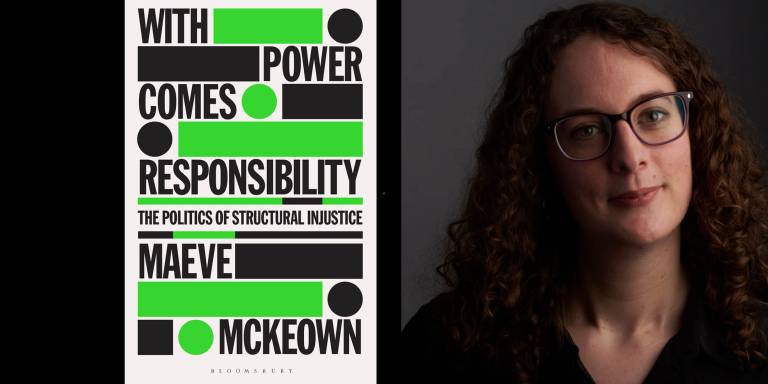IAS Book Launch: With Power Comes Responsibility
29 February 2024, 4:30 pm–6:30 pm

Join us for the launch of Maeve McKeown's first book 'With Power Comes Responsibility: The Politics of Structural Injustice'
This event is free.
Event Information
Open to
- All
Availability
- Yes
Cost
- Free
Organiser
-
Institute of Advanced Studies
Location
-
Common Ground, G11Ground Floor, South Wing Wilkins BuildingGround floor, Wilkins buildingLondonWC1E 6BTUnited Kingdom
When we think of injustice, we normally think of cases where we can point to one person or organisation and hold them responsible. But structural injustice is different. In cases like sweatshop labour, homelessness, poverty or climate change, there are millions of different agents involved, so it is not possible to point to one agent and say they caused it and it is their responsibility to fix it. Structural injustice is the unintended consequence of agents acting within structures in which they are constrained and cannot avoid participating. The result is the oppression and domination of certain social groups, without a dominating or oppressor agent we can point to and blame.
At least, this is the story we have been told about structural injustice so far. In her first book With Power Comes Responsibility: The Politics of Structural Injustice, Maeve McKeown tells a different story. Sometimes structural injustice is an unintended accumulation of disparate activities, and it will require wholesale systemic change to overcome. However, there are also cases where the injustice could be ameliorated without wholesale structural change, but the agents with the capacity to make these changes fail to do it. In yet other cases, even though structural injustice emerges from the accumulation of multiple processes and activities, there are powerful agents that deliberately perpetuate the injustice because they benefit from it. McKeown calls these different types of structural injustice pure, avoidable and deliberate respectively. In distinguishing different types of structural injustice in this way, it follows that not all agents are equally responsible for it or responsible in the same way.
A critical theory of structural injustice should incorporate power. Thus, this book addresses the questions: what does it mean for injustice to be structural, or what is structural injustice? What is the relationship between power and structural injustice? Who bears responsibility for structural injustice? And what can ordinary individuals do about it? McKeown explores these questions using the case studies of sweatshops, poverty and climate change. She addresses the moral responsibility of powerful agents versus the political responsibility of ordinary individuals. And she assesses our responsibility for historical, as well as contemporary structural injustice, and what actions we can take.
For the book launch, Professor Jonathan Woolf (Oxford University) and Professor Sir Michael Marmot (UCL) have agreed to comment on the book, and Maeve McKeown will be on hand to respond.
The book will be published by Bloomsbury Academic on 8 February 2024. To learn more about Maeve's work, please visit her website.
About the Speaker
Maeve McKeown
at University of Groningen
Maeve McKeown is a political theorist based in Groningen, the Netherlands. She is currently an Assistant Professor in Political Theory at the interdisciplinary faculty Campus Fryslân, University of Groningen and is a member of the Young Academy Groningen.
As a political theorist, Maeve researches responsibility for global structural injustice. Alongside her first book, her edited volume with Jude Browne, What is Structural Injustice? (Oxford University Press), will be published Open Access in February 2024.
Before joining Campus Fryslân in 2021, she was a Lecturer in Philosophy at Cambridge University from 2019, she held a Junior Research Fellowship at St Hilda’s College, University of Oxford, and a Postdoctoral Research fellowship at Justitia Amplificata, Goethe University Frankfurt. She obtained her PhD from University College London in 2015. Maeve has published in Philosophy Compass, Contemporary Political Theory, The Journal of Social Philosophy, European Journal of Political Theory and the International Encyclopedia of Ethics.
 Close
Close

